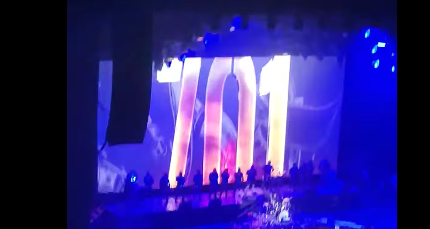
In a significant blow to their international career, Mexican regional band Los Alegres del Barranco have had their U.S. work and tourist visas revoked following a controversial performance in the Mexican city of Guadalajara. During their March 29 concert at the Auditorio Telmex, the group projected images of notorious drug lords Joaquín "El Chapo" Guzmán, the leader of El Cartel de Sinaloa, and Nemesio Oseguera Cervantes, alias "El Mencho," while performing songs that glorified these figures.
Also, there is an open investigation against them, and even the Mexican president, Claudia Sheinbaum, condemned their actions.
The U.S. Department of Homeland Security took swift action, canceling the visas of band members Armando Moreno Álvarez, José Pavel Moreno Serrano, José Carlos Moreno Álvarez, and Cristóbal Reyes López, reported Spanish newspaper El País.This decision underscores the U.S. government's stance against individuals or groups perceived to be promoting organizations designated as terrorist entities.
The concert, part of the event titled "Los Señores del Corrido," featured Los Alegres del Barranco performing 'El del Palenque' a song with lyrics that reference the CJNG and its leader, El Mencho. During the performance, images of El Mencho were projected on large screens, eliciting cheers from the audience but sparking widespread condemnation online and from authorities.
Later, they played a song celebrating El Chapo, while his first mugshot appeared on the big screen behind them.


The fallout has been swift and multifaceted. The Jalisco State Prosecutor's Office has initiated an investigation into the band for possible "apología del delito" (glorification of crime), a charge that can carry penalties ranging from one to six months in prison under Article 142 of the Jalisco Penal Code.
Jalisco Governor Pablo Lemus Navarro confirmed that the State Attorney General's Office (FGE) will summon the members of the band Los Alegres del Barranco and their producer to testify.
Sabemos que la indignación no es suficiente.
— Pablo Lemus Navarro (@PabloLemusN) April 1, 2025
Por eso la @FiscaliaJal citará a declarar al productor y al grupo Los Alegres del Barranco por hacer apología de la violencia el sábado pasado en su concierto del @AuditorioTelmex de la @udg_oficial.
Además he instruido que cualquier… pic.twitter.com/XEnFHcN7Pv
In response to the controversy, the Auditorio Telmex and its affiliated institution, the University of Guadalajara (UdeG), have publicly distanced themselves from the content displayed during the concert. The auditorium's administration emphasized that it operates as a rental space and does not control the repertoire or visual materials artists choose to present. Nevertheless, they announced plans to revise contracts to include clauses prohibiting any acts that could be interpreted as glorifying criminal activity.
The incident has reignited the debate over narcocorridos—songs that narrate the exploits of drug traffickers—and their place in Mexican culture. While some defend these songs as cultural expressions reflecting the country's complex realities, others argue they contribute to the normalization of violence and criminality. States like Nayarit, Sinaloa, Baja California, Chihuahua, and Quintana Roo have enacted measures to restrict or sanction the public performance of narcocorridos, though Jalisco has not implemented such regulations.
This is not the first time the U.S. has taken action against artists linked to the promotion of cartel culture. In 2017, singer Julión Álvarez and soccer player Rafael Márquez faced sanctions for alleged ties to drug trafficking organizations, resulting in the freezing of their U.S. assets and the revocation of visas.
The revocation of Los Alegres del Barranco's visas serves as a stark reminder of the international ramifications artists can face when their work is perceived as endorsing or glorifying criminal entities. As the band navigates the legal and professional consequences of their actions, the incident underscores the ongoing tension between cultural expression and the responsibility to avoid promoting figures associated with violence and crime.
© 2025 Latin Times. All rights reserved. Do not reproduce without permission.







